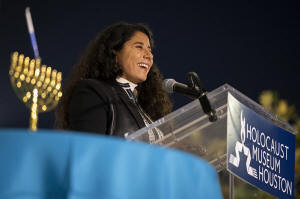In a calendar rarity, Hanukkah starts this year on Christmas Day
 Send a link to a friend
Send a link to a friend
 [December 23, 2024]
By DAVID CRARY [December 23, 2024]
By DAVID CRARY
Hanukkah, Judaism’s eight-day Festival of Lights, begins this year on
Christmas Day, which has only happened four times since 1900.
For some rabbis, the intersection of the two religious holidays provides
an auspicious occasion for interfaith engagement.
“This can be a profound opportunity for learning and collaboration and
togetherness,” said Rabbi Josh Stanton, a vice president of the Jewish
Federations of North America. He oversees interfaith initiatives
involving the 146 local and regional Jewish federations that his
organization represents.
“The goal is not proselytizing; it's learning deeply from each other,”
he said. “It’s others seeing you as you see yourself.”
One example of togetherness: a Chicanukah party hosted Thursday evening
by several Jewish organizations in Houston, bringing together members of
the city’s Latino and Jewish communities for a “cross cultural holiday
celebration." The venue: Houston’s Holocaust museum.
The food on offer was a blend of the two cultures — for example a latke
bar featuring guacamole, chili con queso and pico de gallo, as well as
applesauce and sour cream. The doughnut-like pastries were sufganiyot —
a Hanukkah specialty — and buñuelos, And the mariachi band took a crack
at playing the Jewish folk song “Hava Nagila.”

“What really brings us together is our shared values — our faith, our
families, our heritage,” said Erica Winsor, public affairs officer for
the Jewish Federation of Greater Houston.
Rabbi Peter Tarlow, executive director of the Houston-based Center for
Latino-Jewish Relations, said the first Chicanukah event 12 years ago
drew 20 people, while this year the crowd numbered about 300, and could
have been larger had not attendance been capped. He said the party-goers
were a roughly even mix of Latinos — some of them Jews with Latin
American origins — and “Anglo” Jews.
“There’s too much hate, too much separation against both Jews and
Latinos,” Tarlow said. “This is a way we can come together and show we
support each other.”
While Hanukkah is intended as an upbeat, celebratory holiday, rabbis
note that it’s taking place this year amid continuing conflicts
involving Israeli forces in the Middle East, and apprehension over
widespread incidents of antisemitism.
Rabbi Moshe Hauer, executive vice president of the Orthodox Union,
acknowledged that many Jews may be feeling anxious heading into Hanukkah
this year. But he voiced confidence that most would maintain the key
tradition: the lighting of candles on menorah candelabras and displaying
where they’re visible through household windows and in public spaces.
“The posture of our community — without stridency, just with
determination — is that the menorah should be in our windows, in a place
where the public sees it,” Hauer said.
“It is less for us, the Jewish community, than for the world,” he added.
“We have to share that light. Putting the menorah in the window is our
expression of working to be a light among the nations.”
Hauer concurred with Stanton that this year’s overlap of Hanukkah and
Christmas is “an exceptional opportunity to see and experience the
diversity of America and the diversity of its communities of faith.”

[to top of second column]
|

Harris County Judge Lina Hidalgo speaks during a Chicanukah event at
Holocaust Museum Houston on Thursday, December 19, 2024, in Houston.
(AP Photo/Annie Mulligan)
 Rabbi Motti Seligson, public
relations director for the Hasidic movement Chabad-Lubavitch, noted
that this year marks the 50th anniversary of a milestone in the
public lightings of menorahs. It was on Dec. 8, 1974 — as part of an
initiative launched by the Lubavitcher leader, Rabbi Menachem M.
Schneerson — that a menorah was lit outside Philadelphia’s
Independence Hall, where the Liberty Bell was housed at the time.
"Hanukkah is a celebration of religious liberty, so that it’s not
taken for granted,” Seligson said. “One of the ways of doing that is
by celebrating it publicly.”
He said Chabad was organizing about 15,000 public menorah lightings
this year through its numerous branches around the world.
“There certainly is some apprehension,” Seligson said, referring to
concerns about antisemitism and political friction. “Some people
question whether Jews will be celebrating as openly as in the past.”
“What I’m hearing is there’s no way that we can’t,” he added. “The
only way through these difficult times is by standing stronger and
prouder and shining brighter than ever.”
Stanton concurred.
“Through our history, we’ve been through moments that are easy and
moments that are hard,” he said. “Safety for us does not come from
hiding. It comes from reaching out.”
Why is Hanukkah so late this year? The simple answer is that the
Jewish calendar is based on lunar cycles, and is not in sync with
the Gregorian calendar which sets Christmas on Dec. 25. Hanukkah
always begins on the 25th day of the Jewish month of Kislev, a date
which occurs between late November and late December on the
Gregorian calendar.
The last time Hanukkah began on Christmas Day was in 2005. But the
term “Chrismukkah” — signifying the overlap of the two holidays —
had become a popular term before then. The term gained extra
currency in 2003, when the character Seth Cohen on the TV drama “The
O.C.” embraced the fusion holiday as a tribute to his Jewish father
and Protestant mother.

This season, the Hallmark Channel introduced a new Christmas movie
called “Leah’s Perfect Gift,” depicting a young Jewish woman who had
admired Christmas from a distance, and gets a chance to experience
it up close when her boyfriend invites her to spend the holidays
with his family. Spoiler alert: All does not go smoothly.
Despite such storylines suggesting a fascination with Christmas
among some Jews, Stanton says research by the Jewish Federations
reveals a surge in Jews seeking deeper connections to their own
traditions and community, as well as a surge in Jews volunteering
for charitable activities during the holidays.
“The opportunity is to share with others how we celebrate Hanukkah,”
he said. “It’s a holiday of freedom, hope, showing proudly you are
Jewish.” ___
Associated Press religion coverage receives support through the AP’s
collaboration with The Conversation US, with funding from Lilly
Endowment Inc. The AP is solely responsible for this content.
All contents © copyright 2024 Associated Press. All rights reserved |